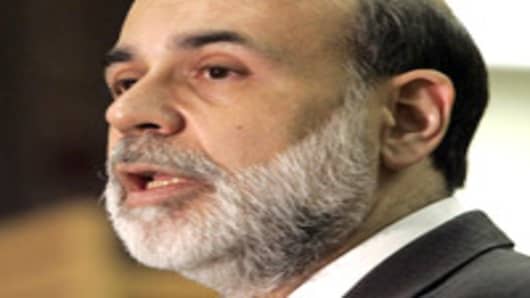The Federal Reserve is expected to hold interest rates steady and indicate slightly greater unease on inflation, while stopping well short of signaling higher borrowing costs are imminent.
The Fed's policy-setting Federal Open Market Committee resumed work on the second day of a two-day meeting at around 9 a.m., a Fed official said.
A statement outlining the U.S. central bank's decision and thinking on the economy is due around 2:15 p.m.
U.S. policy-makers face a deepening housing decline that looks like it will be a drag on economic growth for months to come, even as surging oil and commodity prices threaten to ignite broader inflation.
The Fed lowered the interbank federal funds rate to 2 percent at its last meeting on April 29-30 and has suggested it hopes rate reductions totaling 3.25 percentage points since mid-September will be enough to help the economy rebound from the housing downturn and a credit crunch.
Fed officials have little room to maneuver.
While they have shown no inclination to lower rates further, they are still concerned about the economy's weakness. At the same time, they are worried that steep increases in food and energy costs could begin to exert upward pressure on a wider range of prices.
"Given the uncertainty about both upside and downside risks, the Fed is likely to stay on hold indefinitely," Deutsche Bank economists Joseph LaVorgna and Carl Riccadonna said in a note to clients.
A barometer of business investment, non-defense capital goods orders excluding aircraft, fell in May, but by less than expected, a government report on Wednesday showed. Also, new orders for long-lasting manufactured goods were unchanged last month after two consecutive months of decline.
"It still suggests that American companies are not a significant drag on the economy yet even though profits have been squeezed by rising costs," said Gary Thayer, an economist at Wachovia Securities in St. Louis.
Reports earlier this week showed a big drop in U.S. consumer sentiment in June and a continued slide in house prices, illustrating the continued risks to growth.
At the same time, news that the largest U.S. chemical maker, Dow Chemical, would raise prices by as much as 25 percentand that mining titan Rio Tinto had secured a deal with China's largest steel maker to nearly double the price Rio gets for iron ore raised the specter of inflation.
Analysts expect the U.S. central bank's statement to reflect the view expressed recently by Fed Chairman Ben Bernanke that the economy appears to have skirted a deep recession.
"Concern about 'tail risk' of a severe downturn appears to have lessened since the last meeting, although downside risks to growth remain," Lehman Brothers economists Michael Hanson, Michelle Meyer and Zach Pandl wrote in a note to clients.
With risks of a deep downturn fading, Bernanke and Fed Vice Chairman Donald Kohn have ratcheted up their warnings about the risk of inflation in recent weeks, emphasizing their resolution that expectations for higher inflation do not build.
Any unmooring of inflation expectations could trigger a harmful spiral of rising prices and wages, they cautioned.
Analysts expect the central bank to nod to those inflation worries in its announcement, but said the Fed would be very careful to avoid feeding market expectations that a rate-raising cycle is about to start.


